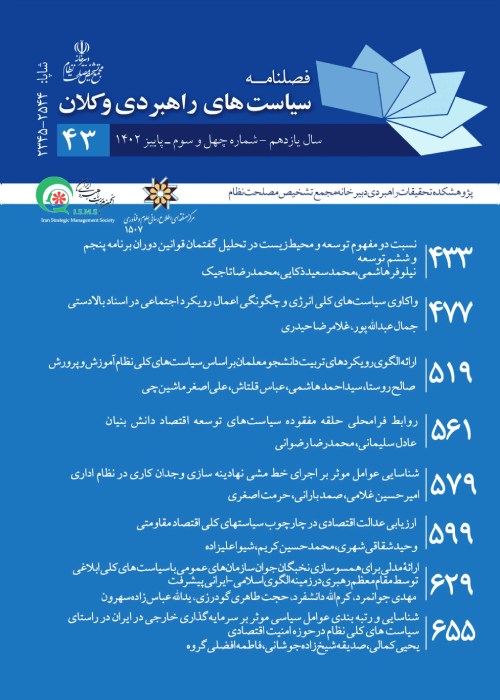Policymaking and Water Crisis in Iran
Author(s):
Article Type:
Research/Original Article (دارای رتبه معتبر)
Abstract:
The water crisis in Iran for nearly two decades has become an important concern for people and politicians and has always been raised in the media. Locating in dry and semi-arid belt and low rainfall, there are few water resources in Iran. Resource management should offset water scarcity through a variety of methods, due to population growth and agricultural and industrial development . The government has the most important role in this regard, which needs to have a good policy for water management. However, at the present moment water crisis is not considered as a priority for policymakers, and the lack of a well-structured program, as well as poor performance of the authorities has worsened the country’s water resources. Various institutions are involved in water resources management, which are generally divided into policy and executive institutions. Water resources policymakers have not yet come up with coherent and clear policies for understanding the water crisis and for a genuine crisis resolution. In the area of executive bodies, every water-related entity, regardless of the water crisis and the consequences of implementing sectoral policies on water resources, is trying to meet its organizational goals. The lack of expertise and coherent policies in the face of the water crisis and the implementation of sectoral policies without sufficient attention to water scarcity have put the country’s development policies on the water resources and the challenges of the water crisis are constantly increasing. The main question of the article is what is the policy of water in Iran since 2001? Based on this question, our hypothesis is that the water crisis is not well positioned in macroeconomic policy, leading to a lack of clear and comprehensive planning for the crisis and that existing programs are partly due to lack of coordination between institutions and agencies. The water crisis has not finally come to end.
Keywords:
Language:
Persian
Published:
Quarterly Journal of The Macro and Strategic Policies, Volume:7 Issue: 27, 2019
Pages:
410 to 435
magiran.com/p2122690
دانلود و مطالعه متن این مقاله با یکی از روشهای زیر امکان پذیر است:
اشتراک شخصی
با عضویت و پرداخت آنلاین حق اشتراک یکساله به مبلغ 1,390,000ريال میتوانید 70 عنوان مطلب دانلود کنید!
اشتراک سازمانی
به کتابخانه دانشگاه یا محل کار خود پیشنهاد کنید تا اشتراک سازمانی این پایگاه را برای دسترسی نامحدود همه کاربران به متن مطالب تهیه نمایند!
توجه!
- حق عضویت دریافتی صرف حمایت از نشریات عضو و نگهداری، تکمیل و توسعه مگیران میشود.
- پرداخت حق اشتراک و دانلود مقالات اجازه بازنشر آن در سایر رسانههای چاپی و دیجیتال را به کاربر نمیدهد.
In order to view content subscription is required
Personal subscription
Subscribe magiran.com for 70 € euros via PayPal and download 70 articles during a year.
Organization subscription
Please contact us to subscribe your university or library for unlimited access!


